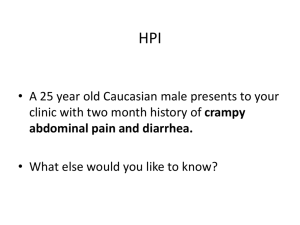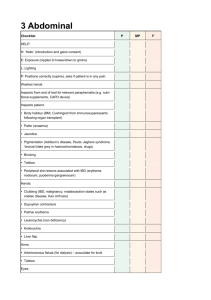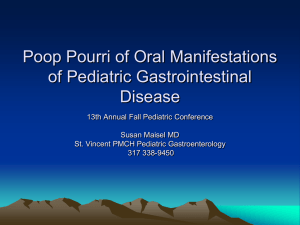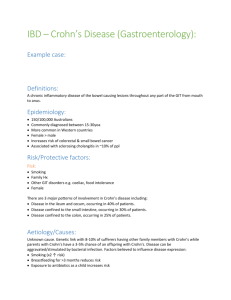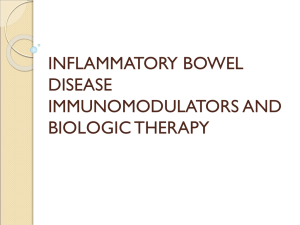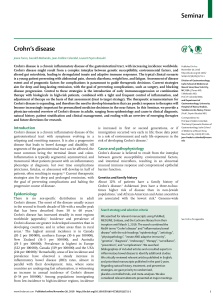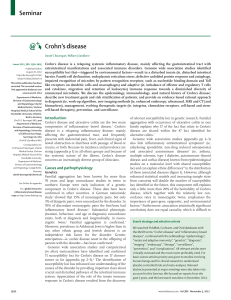50 Inflammatory Bowel Disease Jeffrey Raphael Abergel and Kiron M. Das
advertisement
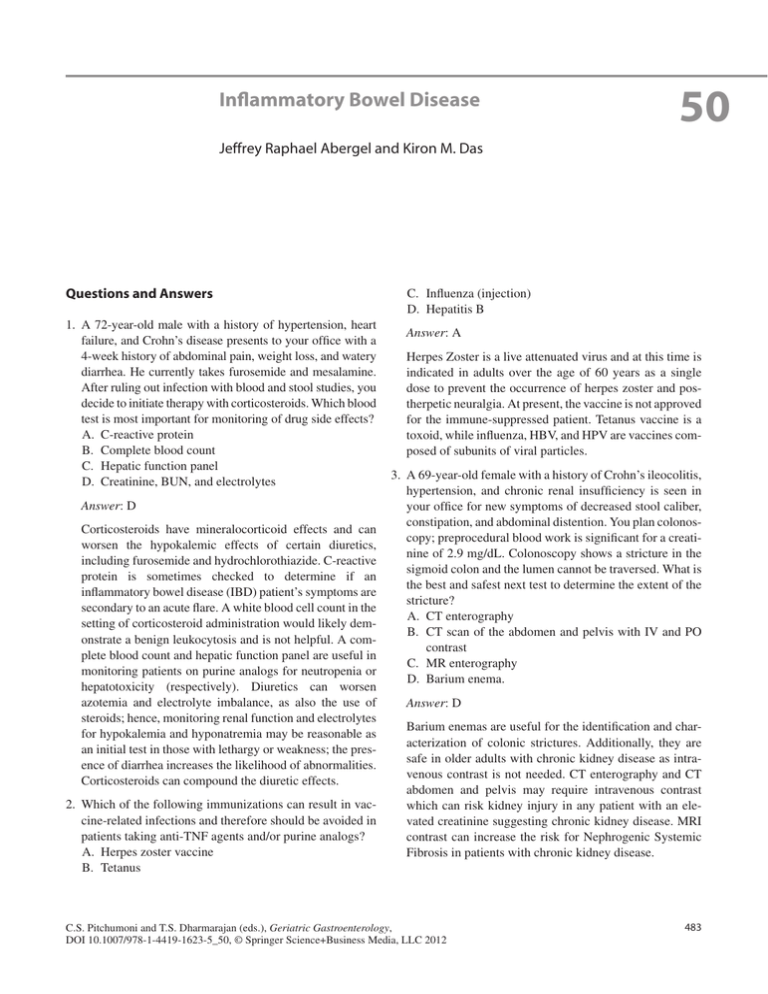
Inflammatory Bowel Disease 50 Jeffrey Raphael Abergel and Kiron M. Das Questions and Answers 1. A 72-year-old male with a history of hypertension, heart failure, and Crohn’s disease presents to your office with a 4-week history of abdominal pain, weight loss, and watery diarrhea. He currently takes furosemide and mesalamine. After ruling out infection with blood and stool studies, you decide to initiate therapy with corticosteroids. Which blood test is most important for monitoring of drug side effects? A. C-reactive protein B. Complete blood count C. Hepatic function panel D. Creatinine, BUN, and electrolytes Answer: D Corticosteroids have mineralocorticoid effects and can worsen the hypokalemic effects of certain diuretics, including furosemide and hydrochlorothiazide. C-reactive protein is sometimes checked to determine if an inflammatory bowel disease (IBD) patient’s symptoms are secondary to an acute flare. A white blood cell count in the setting of corticosteroid administration would likely demonstrate a benign leukocytosis and is not helpful. A complete blood count and hepatic function panel are useful in monitoring patients on purine analogs for neutropenia or hepatotoxicity (respectively). Diuretics can worsen azotemia and electrolyte imbalance, as also the use of ­steroids; hence, monitoring renal function and electrolytes for hypokalemia and hyponatremia may be reasonable as an initial test in those with lethargy or weakness; the presence of diarrhea increases the likelihood of abnormalities. Corticosteroids can compound the diuretic effects. 2. Which of the following immunizations can result in vaccine-related infections and therefore should be avoided in patients taking anti-TNF agents and/or purine analogs? A. Herpes zoster vaccine B. Tetanus C. Influenza (injection) D. Hepatitis B Answer: A Herpes Zoster is a live attenuated virus and at this time is indicated in adults over the age of 60 years as a single dose to prevent the occurrence of herpes zoster and postherpetic neuralgia. At present, the vaccine is not approved for the immune-suppressed patient. Tetanus vaccine is a toxoid, while influenza, HBV, and HPV are vaccines composed of subunits of viral particles. 3. A 69-year-old female with a history of Crohn’s ileocolitis, hypertension, and chronic renal insufficiency is seen in your office for new symptoms of decreased stool caliber, constipation, and abdominal distention. You plan colonoscopy; preprocedural blood work is significant for a creatinine of 2.9 mg/dL. Colonoscopy shows a stricture in the sigmoid colon and the lumen cannot be traversed. What is the best and safest next test to determine the extent of the stricture? A. CT enterography B.CT scan of the abdomen and pelvis with IV and PO contrast C. MR enterography D. Barium enema. Answer: D Barium enemas are useful for the identification and characterization of colonic strictures. Additionally, they are safe in older adults with chronic kidney disease as intravenous contrast is not needed. CT enterography and CT abdomen and pelvis may require intravenous contrast which can risk kidney injury in any patient with an elevated creatinine suggesting chronic kidney disease. MRI contrast can increase the risk for Nephrogenic Systemic Fibrosis in patients with chronic kidney disease. C.S. Pitchumoni and T.S. Dharmarajan (eds.), Geriatric Gastroenterology, DOI 10.1007/978-1-4419-1623-5_50, © Springer Science+Business Media, LLC 2012 483 484 4. Which characteristic is most likely in older patient with IBD compared to their younger counterparts? A. More likely to have affected family members. B. Abdominal pain as a presenting symptom C. Fistulas in patients with Crohn’s disease. D.Lower rate of lymphoproliferative disorders in older patients on purine analogs. Answer: C Older patients with Crohn’s disease are at a higher risk of developing both fistulas and strictures. Younger patients J.R. Abergel and K.M. Das with IBD tend to present with abdominal pain and have affected relatives. Older patients with IBD on purine analogs are at an above average risk of developing lymphoproliferative disorders. However, the most likely feature nevertheless is still fistulas in the older patient with Crohn’s disease.

